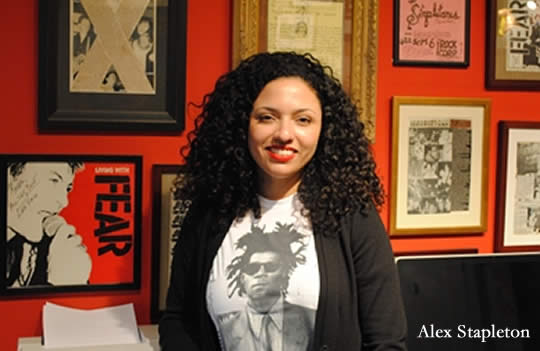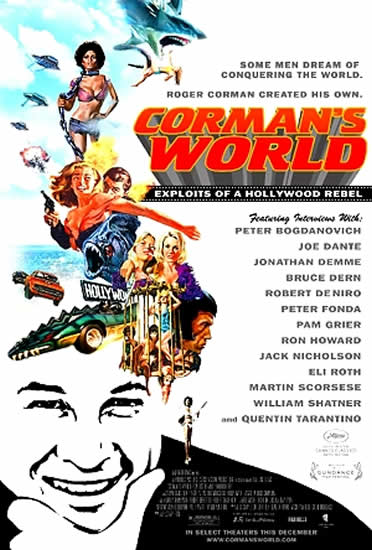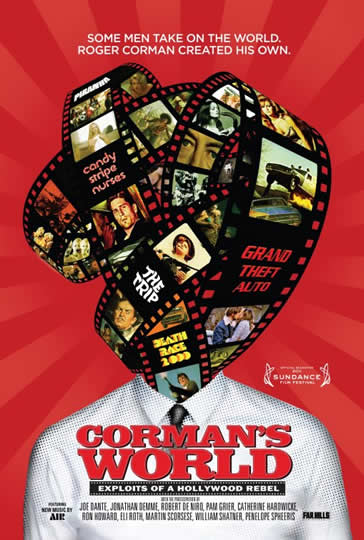An indie film renaissance is emerging, and filmmakers like Alex Stapleton are pioneering it. Stapleton is the director of “Corman’s World: Exploits of a Hollywood Rebel,” a docu-tribute to Roger Corman, the B-movie master who launched the careers of so many A-Listers.
(See review of “Corman’s World”)
Stapleton’s own filmmaking reflects the Corman legacy—the die-hard, do-it-yourself, guerilla approach. She threw herself into the work with no directing experience, technical training, or initial funding. Living off her savings and going deep into credit card debt, she managed to pull off an extraordinary feat of indie filmmaking.
I met with Alex to talk about Roger Corman, the making of “Corman’s World,” and the world of independent film today.
Gabriel Ryder: What inspired you to tell Roger Corman’s story?
Alex Stapleton: What started the whole thing from the get-go was that I was a fan of Roger’s without even realizing it. I liked a lot of his movies, in particular his Pam Grier films. I grew up on the B-side with my parents. They exposed me to the films of John Waters before I watched “Rocky”. I had an interesting childhood [laughs].
So, Roger Corman was in that vein. His movies were peppered into what I grew up watching. And at a certain point, when I declared that I wanted to become a filmmaker, around the age of 19, I dropped out of school. I just wanted to start making stuff. I wanted to direct. So I got my hands on three or four autobiographies and biographies of filmmakers, and one of those was Roger’s autobiography. When I read it, I thought, ‘Wow, this one human being was responsible for all of this stuff?’ And not only is he responsible for all of these movies that I grew up watching, he’s also responsible for starting the careers of many of my film icons. And that was the first time the light bulb went off, and I was like, ‘This is an amazing story.‘
direct. So I got my hands on three or four autobiographies and biographies of filmmakers, and one of those was Roger’s autobiography. When I read it, I thought, ‘Wow, this one human being was responsible for all of this stuff?’ And not only is he responsible for all of these movies that I grew up watching, he’s also responsible for starting the careers of many of my film icons. And that was the first time the light bulb went off, and I was like, ‘This is an amazing story.‘
I thought I had found the holy grail of filmmakers, but all my friends in film school were like, ‘Who’s Roger Corman?’ So, through my years of working in the film industry, the idea of doing a story about him grew every year because I was dismayed at the fact that even people who worked in the industry didn’t know who he was. Then I got involved with documentaries as a producer and I realized that you can make documentaries that are more pop culture oriented, so I thought, ‘Okay, my next project will be a film about Roger Corman.’
GR: It’s a piece of cinematic history that you captured, especially with all the people you got to speak up. Until now it was unrecorded.
AS: Yeah. It had been written about, but no one had picked up the camera and done it. And if it wasn’t me, it was definitely going to be someone else. I mean, there was actually another movie going on when I started. When I started, I did an article on Roger and afterward I was like, ‘Can I do a movie about you?’ and he said, ‘Okay,‘ which was just crazy. So for two years, I quit working and I went through my entire savings, and I basically dropped off the planet and watched every Roger Corman movie I possibly could. I was studying them and watching DVD commentaries and all the extras. I was also reading, not just Roger’s story, but Bruce Dern’s story, Jack Nicholson’s story, Scorsese’s story, so that I could be well versed in the story as a whole. I was also paying a crew to follow Roger when I could.
 Two years after that, I had enough footage to put together a trailer, and I got financed within two weeks. It was amazing. And that’s when I was about to move to L.A., everything was hunky-dory. Then I got a call from Roger telling me that some big industry people wanted to make a film about him, and maybe we could all work together. So the producer called, and he was basically saying ‘Stay in Brooklyn little girl, the big boys are going to handle this.‘ So I called Roger back and was trying to reason with him, but he was hesitant, because this director had won Oscars and had also started with Roger. And I just started crying, and he was like, ‘Fine. I gave you my word first. I’ll take care of it.’ So, the movie was definitely going to get made either way. I just wanted my story to be more heartfelt and sincere.
Two years after that, I had enough footage to put together a trailer, and I got financed within two weeks. It was amazing. And that’s when I was about to move to L.A., everything was hunky-dory. Then I got a call from Roger telling me that some big industry people wanted to make a film about him, and maybe we could all work together. So the producer called, and he was basically saying ‘Stay in Brooklyn little girl, the big boys are going to handle this.‘ So I called Roger back and was trying to reason with him, but he was hesitant, because this director had won Oscars and had also started with Roger. And I just started crying, and he was like, ‘Fine. I gave you my word first. I’ll take care of it.’ So, the movie was definitely going to get made either way. I just wanted my story to be more heartfelt and sincere.
GR: What can you tell me about the DVD?
AS: It’s going to include a lot of things that we didn’t get to talk about in the movie, which I’m really excited about. There are so many people I interviewed that didn’t make the 90-minute cut. So the DVD is a chance to hear different people like Monte Hellman who I’m a big fan of. He has a huge fan base.
Another huge person that I cut was the story of Floyd Crosby. Floyd Crosby was Roger’s DP (director of photography) and was also the father of David Crosby. I interviewed David because Floyd just passed away. But Floyd Crosby was blacklisted in the 50s for having European, liberal friends basically. He couldn’t get work, even though he won the first ever academy award for cinematography for “Tabu.” He’s the guy that shot “High Noon,” and yet he couldn’t get a job. He fought for this country in WWII, and he did the newsreels. He shot the war footage, and was medaled, but he was just liberal, so he was blacklisted.
David Crosby had these really emotional stories, because his father was very old-school and very proud. He said his father was very grateful to Roger, because Roger didn’t give a fuck that he was blacklisted. Roger was like, ‘Hey, I don’t know anything about movie-making. Maybe this guy wants to work.’ He wasn’t afraid of any repercussions because he was an independent. So Floyd shot maybe 95% of Roger’s films as director, and David remembers Roger. At one point in the DVD extras he is talking about how, if it weren’t for Roger, he wouldn’t have had food on the table. So, when you start meeting people and hearing their stories, all of sudden the movie just changes.
GR: Roger Corman has always championed underdogs. In a sense, you were an underdog and he put his confidence in you. And it seems like the actual making of “Corman’s World” was kind of guerilla and DIY as well.
AS: Oh yeah. I had a somewhat successful career in New York in commercials. I was making a really good living, had a really nice life, and a nice boyfriend. Everything was perfect until I fucking started this movie. And I don’t know, this rage took over. I got so obsessed with making the film that I just trusted in this higher thing. And I thought, ‘You know what, I’m not going to worry. I’m just going to take it day by day, and let the universe kind of take care of me.’ And that’s what happened.
I had to go through a lot. I put myself in major debt, charging up credit cards. I mean, screw the money part, I didn’t even know what I was doing. I had never directed anything in my life. But I knew I had enough connections to people to go to for advice. It was like baby steps, the whole process. Everything just kind of unfolded.
One thing I have learned from other filmmakers, and it is a quality of Roger’s is that when you’re sincere about what you are doing, the world kind of takes care of you. It’s the people that have an  interest in films out of vanity…it just doesn’t go anywhere. But I think if you really want to tell the story, it will find its way. Even though Roger was making monster movies, they were the movies he really wanted to make. And there’s a sincerity there. You can tell a low-budget Roger Corman film from just any low-budget movie. There’s a huge difference. And it’s the same with all of his protégés.
interest in films out of vanity…it just doesn’t go anywhere. But I think if you really want to tell the story, it will find its way. Even though Roger was making monster movies, they were the movies he really wanted to make. And there’s a sincerity there. You can tell a low-budget Roger Corman film from just any low-budget movie. There’s a huge difference. And it’s the same with all of his protégés.
Roger has always told me that the biggest thing he saw in people that were successful versus the people who weren’t successful when they came to work for him was that the guy’s that came into his office and were like, ‘You know what, thank you for hiring me for this women in prison movie. I’m going to give you the best women in prison movie that’s ever been made.’ And they worked day and night to deliver, and they never looked at it as just a stepping-stone. Those were the guys that became Jonathan Demme or Ron Howard. The guys who put in half-assed efforts because they thought it was just Exploitation never made it.
GR: I think there are a lot of artists out there who feel that sincerity has no place in the industry, so they end up not doing anything. What you did with your film by just going for it is inspiring.
AS: Yeah. I mean, I’m the nerd who loves genre films. But what makes genre work, the ones we love, are the ones that have these human stories we can relate to. And going back to the Roger Corman formula versus what we see today, is that there is just more heart. Yeah, you have all the special effects and the gore, but there’s this human story. And I feel that the Hollywood system today wants all the trappings of those stories but they neglect the heart that goes behind it.
GR: Do you think there is a place in the industry, or for indie filmmakers to bring those kinds of stories and that kind of humanity to films in a big way?
AS: Oh yeah. It’s happening. The Internet is molding the indie scene into something completely different, because it’s not about trying to get your movie into a theater anymore. Or you can get played into theaters where you don’t need a film print. You can play digitally now.
There is a bigger freedom that’s going on that’s allowing indie filmmakers and writers or whatever to get their stories out there. The fact that you can self-distribute is pretty awesome. It’s a lot of work, but it’s doable. Documentary directors are doing it left and right. It’s kind of like what Roger was doing in the 50s. He figured out how to distribute. That was the ticket.
As soon as artists start to link-up with more progressive distributors and producers, and stop trying to compete with the studios, it’s going to be awesome. And it’s already happening.
Alex Stapleton is currently working on a docu-series on the history of street art with producer Roger Gastman (Exit Through The Gift Shop). She is also developing documentary-based content for the upcoming YouTube channels, and has a Corman-like narrative feature in the works—an intergalactic love story that takes place on Hollywood Boulevard. The “Corman’s World” DVD was released March 27th.

